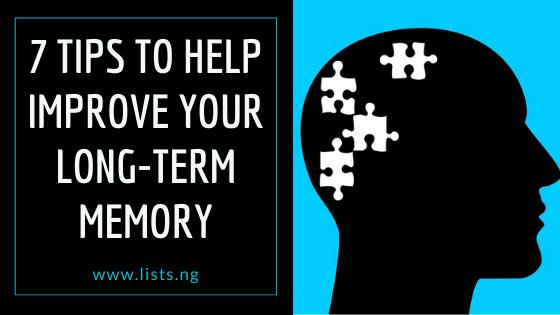Memory loss is a common occurrence, and everyone has their individual moments of lapse of memory. For some this could be as a result of neurological conditions like Alzheimer and genetics, while for others it is just a random occurrence that comes up sporadically or frequently.
For those without genetic conditions, memory loss could be as a result of several factors such as lifestyle traits and diet. Below are 7 lifestyle altering tips to help improve your long-term memory.
Healthy eating
Eating healthy affects virtually aspect of your well being, including memory retention. What you eat determines your brain’s capacity to store and remember information. Unhealthy diets like highly-processed foods negatively impact your memory because they add nothing to your brains, unlike foods such as turmeric, broccoli, celery, nuts, green tea etc, all of which supply your brain with essential minerals and nutrients.
Get enough sleep
Poor memory has also been attributed lack of proper or adequate sleep. This is because sleep plays an important role in strengthening short-term memories, in a process where it connects brain cells and transfers information from one brain region to another, thereby resulting in memory consolidation.
Meditate
With the abundance of information that your brain has access to, there is a tendency for it to be over stressed. This leads to your brain absorbing surplus information without storing long-term memories, or any memory at all. However, research have shown that meditation exercises your mental muscles and strengthens tour brain. This in turn prolongs the life of your brain and keeps it from frequent memory loss.
Drink less alcohol
Excessive alcohol intake is bead for your health and this cannot be overemphasised. Along with raising your blood alcohol levels to 0.08 grams per ml or above, alcohol also exhibits neurotoxic effects on the brain and constant drinking can damage the hippocampus, a part of the brain that plays a vital role in memory.
Take a break
Whether you are constantly attending meetings, struggling to meet a deadline or studying for an important exam, it is very important to give your brain a little bit of rest. Overloading your brain with information, will lead to mental fatigue and you may end up not learning anything at all. You can decide to take a few minutes break whenever you are right in a middle of a load of work, or when it seems like you are losing focus. This is the best way to keep yourself productive, creative and alive.
Exercise
From personal experience, this is also an effective way of making your brain retain information. Regular exercise, at least three times a week for 20-30 minutes increases blood flow in your body and supplies the brain with extra oxygen and glucose. Regular physical activity also slows the aging process of the brain.
Exercise your brain
Stretching your mental capabilities is another effective way to boost your memory. This you can do by playing crosswords and card games, learning new vocabulary, learning a new skill or instrument, learning a new language, etc.



